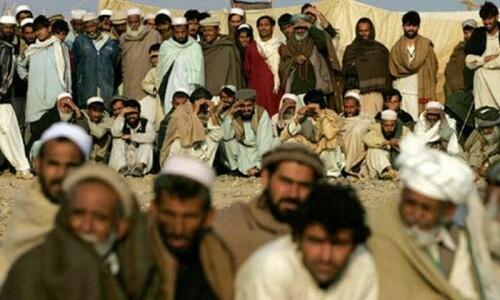Military huddle discusses ‘peace talks’ with TTP

ISLAMABAD: A high-level military huddle on Friday discussed ‘peace talks’ with the banned Tehreek-i-Taliban Pakistan (TTP) and decided to pursue the matter in accordance with “comprehensive security strategy”.
The national security meeting, chaired by Chairman Joint Chiefs of Staff Committee Gen Nadeem Raza, was attended by all three services chiefs — Chief of Army Staff Gen Qamar Javed Bajwa, Chief of Naval Staff Admiral Muhammad Amjad Khan Niazi and Chief of Air Staff Air Chief Marshal Zaheer Ahmed Baber Sidhu —, ISI Director General Lt Gen Nadeem Anjum, Peshawar Corps Commander Lt Gen Faiz Hamid, and other senior officials.
Though the meeting carried the impression of a Joint Chiefs of Staff Committee session, it wasn’t one. A JCSC meeting would normally include the director general of Strategic Plans Division, and secretaries of ministries of defence and defence production, but none of them were there.
It was the first of such meetings, involving all the armed services, since the army-led talks with the militants in Afghanistan assumed a public profile with briefings for political leaders and the Parliamentary Committee on National Security on the issue by the army top brass.
Decides to pursue matter in accordance with ‘comprehensive security strategy’
“The forum was given a detailed briefing on review of national security situation specific to Western Border, Khyber Pakhtunkhwa and Balochistan,” the ISPR said about the meeting. It added that “fast-paced developments in the realm of strategic and conventional policies, the importance of peace in Afghanistan for sustainable development in the region and the operational preparedness of the armed forces” were also discussed.
The participants, the ISPR said, resolved to respond to “entire spectrum of threats” in accordance with the “comprehensive security strategy”.
It apparently means that the approach would go beyond the usual ‘kinetic strategy’ — an apparent reference to the peace talks.
The military leadership had told the political leadership at the earlier briefings that it wanted to give peace a chance, but would respond with full force if the TTP did not abide by the agreement that may be eventually concluded.
The meeting noted its “complete satisfaction” and “full confidence” in the readiness of all the three services.
The participants, the ISPR said, while reaffirming the resolve of the armed forces to befittingly respond to the threats, “lauded the sacrifices of security agencies in the fight against terrorism”.
Published in Dawn, July 23rd, 2022















































